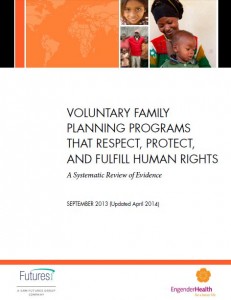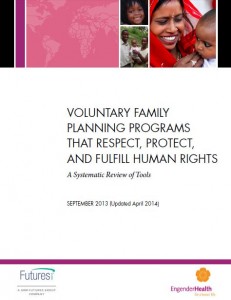Submitted by Shannon Harris, on behalf of the team led by Futures Group and EngenderHealth that developed the Voluntary, Rights-Based Family Planning Framework
Human rights–based family planning (FP) programming—what does it mean? Where do you start to translate it into practice? How comprehensive do you need to be? It is easy to become daunted by a long list of inputs and activities, such as those listed in the voluntary, rights-based family planning framework developed by a team led by Futures Group and EngenderHealth. The recent 2020 Vision newsletter refers to the overwhelming nature of existing guidance documents for ensuring that FP programs are rights-based and offers a simplified starting point. But will simplification of a complex set of challenges lead to the transformation in FP programming that our field needs?
We welcome the dialogue started by Population Action International (PAI) about how to move forward to protect and fulfill human rights within FP programs. This conversation is needed; multiple voices and views add richness to the discussion. PAI suggests starting with three priorities: voluntarism, informed choice, and achieving a diverse method mix. Certainly, we have to start somewhere, and these three elements are essential to rights-based FP— programs must be vigilant in preventing instances of coercion and in ensuring full, free, and informed contraceptive choice.
However, these program elements are not sufficient to ensure equitable access to services for all nor to ensure that the services are of high quality. They also do not address community factors that impede access to and use of FP. And they do not address the issue of accountability. These are critical considerations for reaching and fulfilling the human rights of the 220 million women with an unmet need for FP.




